
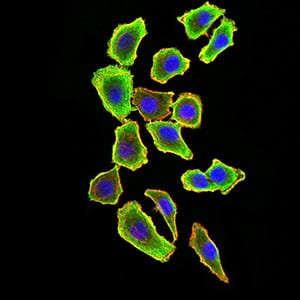
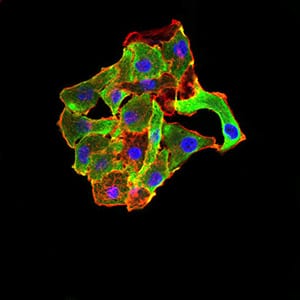
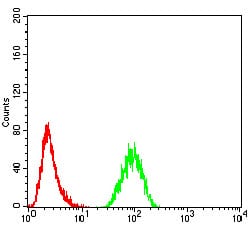
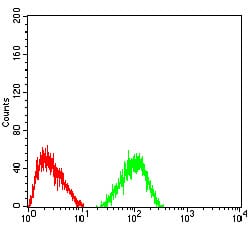
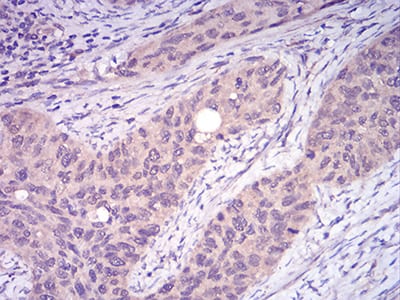
| WB | 咨询技术 | Human,Mouse,Rat |
| IF | 咨询技术 | Human,Mouse,Rat |
| IHC | 1/200 - 1/1000 | Human,Mouse,Rat |
| ICC | 1/200 - 1/1000 | Human,Mouse,Rat |
| FCM | 1/200 - 1/400 | Human,Mouse,Rat |
| Elisa | 1/10000 | Human,Mouse,Rat |
| Aliases | TRAP; TRAP3; MGC:45012 |
| Entrez GeneID | 7186 |
| clone | 5C2C3 |
| WB Predicted band size | 55.8KD |
| Host/Isotype | Mouse IgG1 |
| Antibody Type | Primary antibody |
| Storage | Store at 4°C short term. Aliquot and store at -20°C long term. Avoid freeze/thaw cycles. |
| Species Reactivity | Human |
| Immunogen | Purified recombinant fragment of human TRAF2 (AA: 39-188) expressed in E. Coli. |
| Formulation | Purified antibody in PBS with 0.05% sodium azide |
+ +
以下是关于TRAF2抗体的3篇参考文献示例,包含文献名称、作者和简要摘要内容:
1. **文献名称**:**"TRAF2 is essential for JNK but not NF-κB activation and regulates lymphocyte proliferation and apoptosis"**
**作者**:Hsu, H., Shu, H.B., Pan, M.G., Goeddel, D.V.
**摘要**:该研究利用TRAF2抗体验证了TRAF2在JNK信号通路中的关键作用,发现TRAF2缺失会导致JNK激活受阻,但不影响NF-κB通路。实验通过免疫印迹和免疫沉淀揭示了TRAF2在淋巴细胞增殖与凋亡中的调控机制。
2. **文献名称**:**"TRAF2 must bind to cellular inhibitors of apoptosis for TNF-mediated NF-κB activation"**
**作者**:Vince, J.E., Pantaki, D., Feltham, R., et al.
**摘要**:研究通过TRAF2抗体检测蛋白质相互作用,发现TRAF2需与凋亡抑制蛋白(cIAPs)结合才能介导TNF诱导的NF-κB激活。实验表明,TRAF2-cIAP复合物的形成对细胞存活和炎症反应至关重要。
3. **文献名称**:**"TRAF2 regulates the cytoplasmic/nuclear translocation of IκBα/NF-κB in response to oxidative stress"**
**作者**:Sasaki, C.Y., Barberi, T.J., Ghosh, P., et al.
**摘要**:该研究通过TRAF2抗体进行免疫荧光和Western blot分析,发现氧化应激条件下TRAF2通过调控IκBα的亚细胞定位影响NF-κB活性,揭示了TRAF2在氧化应激相关疾病中的潜在作用。
4. **文献名称**:**"The E3 ligase TRAF2 regulates LUBAC activity by modulating HOIP stability"**
**作者**:Zheng, C., Kabaleeswaran, V., Wang, Y., et al.
**摘要**:文章利用TRAF2抗体研究其与线性泛素链组装复合物(LUBAC)的相互作用,发现TRAF2通过调控HOIP蛋白稳定性影响LUBAC活性,进而参与炎症和细胞死亡信号传导。
以上文献均通过TRAF2抗体进行实验验证,涵盖其在信号通路、疾病机制及蛋白质互作中的功能研究。
TRAF2 (Tumor Necrosis Factor Receptor-Associated Factor 2) is a critical adaptor protein involved in signal transduction pathways mediated by the tumor necrosis factor receptor (TNFR) superfamily and Toll-like receptors (TLRs). It plays a pivotal role in regulating NF-κB and MAPK signaling pathways, which are essential for immune responses, cell survival, apoptosis, and stress responses. TRAF2 interacts with receptors such as TNFR1. TNFR2. and CD40. facilitating the recruitment of downstream signaling components. Its function includes promoting the activation of canonical NF-κB signaling by forming complexes with cIAP1/2 (cellular inhibitor of apoptosis proteins) and stabilizing the kinase RIP1. Conversely, TRAF2 also participates in non-canonical NF-κB signaling by regulating NIK (NF-κB-inducing kinase) degradation. Dysregulation of TRAF2 is linked to inflammatory diseases, autoimmune disorders, and cancer.
TRAF2 antibodies are widely used in research to study its expression, interactions, and signaling mechanisms. These antibodies enable detection of TRAF2 in techniques like Western blotting, immunoprecipitation, and immunofluorescence. Specific antibodies may target distinct epitopes or post-translational modifications, aiding in the investigation of TRAF2’s role in cellular responses. Monoclonal and polyclonal variants are available, with validation across species like human, mouse, and rat. Understanding TRAF2 dynamics through antibody-based assays has advanced insights into its dual roles in pro-survival and pro-apoptotic contexts, as well as its therapeutic potential in modulating inflammatory and oncogenic pathways.
×